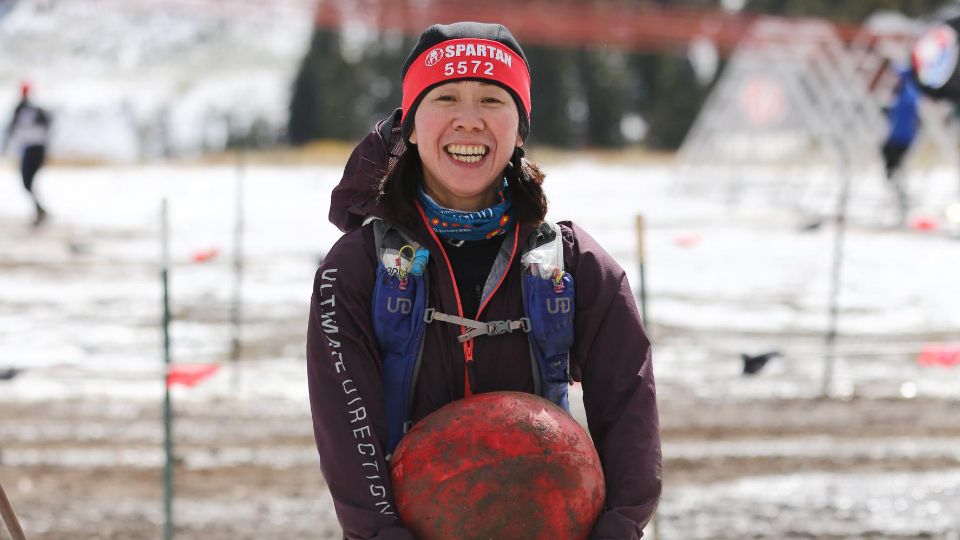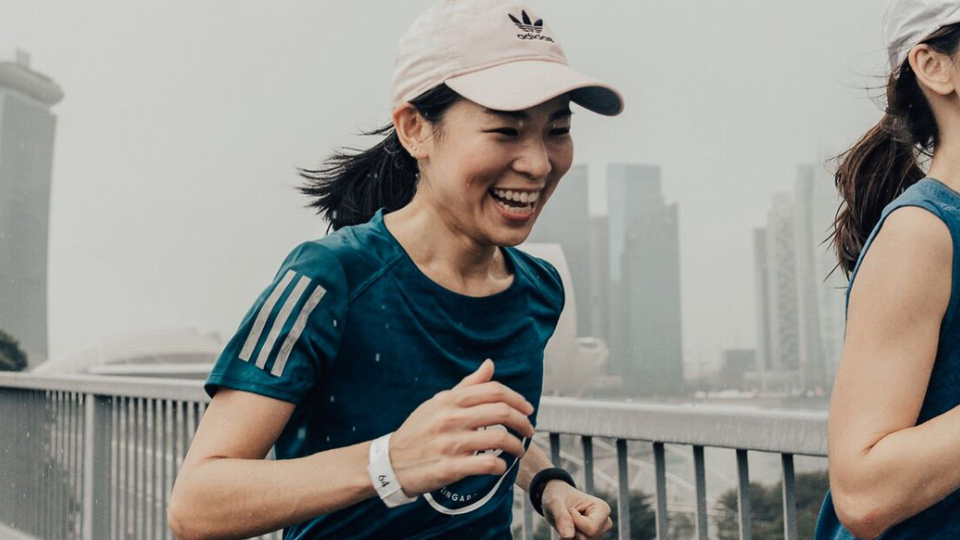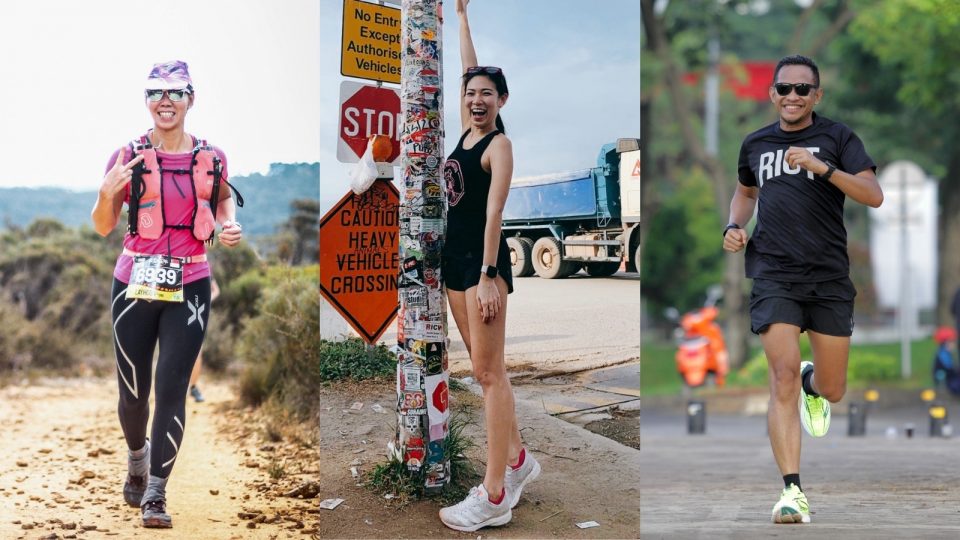Running is a symbol of freedom. Running is more than just sport. It also gives us a feeling of freedom to put our worries behind us for a moment and give us a way out of our hectic life. Through running, you will find that you are able to develop confidence and become stronger to resolve every aspect of your life and well-being with positivity.
We spoke to three runners who share their experience with us about how they have trained to become stronger and optimistic runners when faced with difficulties.
1. Wong Lay Hoon
Bio: Singapore, 40-years-old, Banker

Lay Hoon took part in canoe training and was picked by the cross-country team when she was in school, but she was never a fan. Till now, she still runs, but it was for leisure. She never thought that she would venture beyond 21km.
However, everything changed when she started racing in obstacle races like Spartan. Apart from having the upper body strength to clear obstacles, she knew running was a big part of these races. So, she decided to instil more structure into her training, and she started to see results and won the Spartan SEA Series in 2018 and 2019 in her age group.
She also represented Singapore in Tahoe for the Spartan World Championship in 2019. Lay Hoon started to venture into ultra trail running over the last two to three years and she hasn’t looked back since.
RS: What motivates you to run?
Lay Hoon: I had a mantra when I was racing in Spartan races across the SEA region – small sacrifices, big wins. It was a mantra that kept me focused during my training and pushed me when I’m feeling lethargic after a long day or week at work.
RS: How do you train yourself to become a runner?
Lay Hoon: Some people like structured training, some don’t. In my case, I knew I needed a structure to get focused and have a goal or plan in mind and work towards it, be it towards a spartan race or an ultra-marathon.
Most of the time, the spartan races in the first half of the year are short distances like 5 – 10km races with obstacles, so I usually concentrate on speed work, agility training or HIIT, in order to be faster and be nimble on my feet.
When I train for longer races like the Spartan Beast/Ultra or running ultras, I will build my mileage and focus on longer runs over the weekends to improve my aerobic base. To stay injury free, I subscribe to the 10% rule, i.e., increase your weekly mileage by around 10% from the week before and have a low intensity week after 4 weeks of hard training.
RS: Why do you think running is going to improve your self-esteem as a runner?
Lay Hoon: As you train more specifically and with a purpose, the stronger you will become as a runner. When you see the milestones achieved (e.g., hitting longer distances, improved timings or even feeling less fatigue after training); you will be more confident in your runs and be better prepared for races ahead.
One thing leads to another, and as your confidence in running grows, it will provide a sense of accomplishment, which usually translates into having more confidence towards other areas of your life, be it your views towards work or family.
Additionally, you will also benefit positively from the training as the body transforms, and sometimes muscles or body tones that you may have never seen will start to become more visible and defined. Not to mention the release of happy hormones called endorphins after every run!
RS: How do you find freedom by running when you’re facing hardship? Why is that?
Lay Hoon: COVID-19 came at an interesting year for me as I had just undergone ACL surgery in January last year. When the lockdowns happened in the April-May period, I’d just started taking baby steps back into running, starting from 2 to 3 kms around my neighbourhood.
Every step was difficult, and it felt like an uphill task getting back to my pre-surgery fitness level. There was no physical therapy available then, and I could only run and do strengthening exercises on my own to get stronger.
As the months progressed and as I worked towards my first road marathon 8 months after surgery and a road ultra-close to 2 months later, I had a lot of “Forrest Gump” moments when I was just thankful I could run again and felt like I needed to go out and run to chase sunrises/sunsets to be at one with nature or the outdoors. That’s when I finally discovered my “WHY” after all these years of running.
RS: What does running mean to you?
Lay Hoon: Running used to be just a release from the stresses of life and work. These days, it means so much more. It gives me confidence, knowing I’ll always feel better after a run. No matter if it was a good or a bad run, it keeps me focused on the things I do, it makes me appreciate what I’ve been through as an ACL survivor and makes me feel like I can do so much more for myself and the people around me as I share my running and recovery journey with them.
You can follow Lay Hoon on Instagram: @layhoonw
2. Arri Prima YP
Bio: Indonesian, 40-years-old, Foreign Bank

Arri was diagnosed with bronchitis when he was 13 years old, and running was his therapy. Back in college, he had an injury when he played football; he had low back pain, which forced him to stop all physical activities for over 6 months. Then, he started to walk slowly and needed a year of recovery. He started to run regularly in early 2017.
RS: What motivates you to run?
Arri: Running has been my escape when I was overwhelmed and cluttered. I love the feeling after my running is done, reflecting on my efforts to make time for running, the early morning wake up, listening to my heart pounding, to bear the heat of the sun. I love it when I have a soaking wet sweat; it makes my nerves and mind relaxed. Running is my time.
RS: How do you train yourself to become a runner?
Arri: I used to consistently run three to four times a week. I added strength training and cycling in between. By having consistent training, I could maintain my stamina, fitness level, which enabled me to run longer and further.
RS: Why do you think running is going to improve your self-esteem as a runner?
Arri: By consistently running reflecting my commitment to my personal goal. I’m proud of myself when I can make time to run or exercise. I’m so grateful when I had my personal conquest on my first ultra-trail race back in 2019. Running has changed my life.
I felt so blessed when I accomplished an 86K ultra-charity run and did the fundraising for a good cause I cared about, water for equality. I felt my run was more meaningful and inspiring. I wanted to do more.
RS: How do you find freedom by running when you’re facing hardship? Why is that?
Arri: By running, I decluttered my mind and had a better understanding of myself. I see running as my own competition with myself, to better myself from yesterday’s version. I love the feeling when I run long in the night and in silence, it’s so peaceful, and I found my inner strength and resilience. Will beats skills.
RS: What does running mean to you?
Arri: Running isn’t just about yourself but how you share happiness, inspire others and help others in the same way. Be kind and meaningful.
You can follow Arri on Instagram: @arri.neo
3. Sharon Choo
Bio: Singaporean, 33-years-old, Designer / Art Educator

Sharon started doing consistent endurance running approximately 5 years ago. Prior to endurance running, she was an active individual who enjoyed playing sports, such as netball, tennis and running short-distance track-and-field.
She was noticed by her former colleague, co-founder of the charity running group (The High Panters) she now runs with weekly, during a half-marathon run she did with her netball mates “for fun”, without training.
She made a conscious decision to join the running group, as she believed strongly in the idea of giving back to the community through running. In 2019, she joined Adidas Runners Singapore as a running crew, with the same motto of building healthy communities through running.
RS: What motivates you to run? Why?
Sharon: Running connects me with people. My social circle has expanded since I started running regularly. The running groups I run with, The High Panters and Adidas Runners Singapore have connected me with other like-minded runners whom I now call close friends.
RS: How do you train yourself to become a runner?
Sharon: I currently do not subscribe to any running formula and am not going through a formal training method because running to me has been more about community building. I currently derive more joy in running with my friends than running alone, going through a regime training programme. Anyone can be a runner, as long as you run.
RS: Why do you think running is going to improve your self-esteem as a runner?
Sharon: Running makes me feel empowered. Setting a personal goal and conquering it, knowing that I have full control of my body and mind empowers me, giving me confidence to be resilient and endure trials.
RS: How do you find freedom by running when you’re facing hardship? Why is that?
Sharon: Running is my therapist, and it is a platform to allow me to disconnect. Running was a catalyst to get me back on my feet and, in return, allowed me to unwind after a challenging day at work. Working from home, being contained in the study room was uncomfortable for me, and the runs gave me the opportunity and an excuse to explore new running spots. Running is also a time for me to fully disconnect from the online world, to consciously be present for myself and the people running around me.
RS: What does running mean to you?
Sharon: My favourite quote that comes to mind when running gets tough or when I am going through a crisis is, “Tough times don’t last. Only strong people do.” Running to me is like running life’s race. We keep moving and striving forward, building resilience and grit through tough moments and challenges.
We learn to pace ourselves, celebrate our wins, enjoy the moments and not give up. We finish the race, strong and with integrity. Running has now been part of me and it is here to stay.
You can follow Sharon on Instagram: @iamschoo
Feel free to share your stories and write to us about how you discover freedom through running and how it affects your life.





